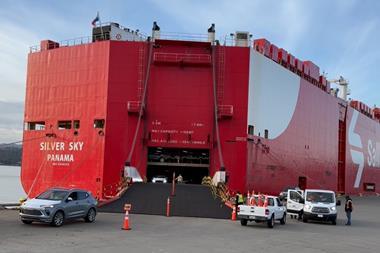
From next week on April 1st, General Motors Europe will implement the outsourcing of its logistics planning, operations and purchasing to logistics provider Gefco. Acting as a 4PL for the carmaker, Gefco will manage GM’s inbound and outbound supply chain across Europe, Russia and Turkey, combining volumes with its established transport and logistics services for PSA Peugeot Citroën, its former majority owner, as well as its other customers.
The contract, which was signed at the end of June last year following a wider alliance between the two OEMs, means the distribution of around 1m vehicles across GM’s brands and the distribution of finished vehicles produced in Europe as well as imports such as Chevrolet from South Korea, and Cadillac and Corvette from North America. It will also mean control of inbound material from European suppliers or ports to GM’s assembly and powertrain plants in Germany, Poland, Spain, the UK and Russia.
Gefco will also be responsible for the transport of aftermarket service parts from suppliers and plants to GM warehouses, but not for final distribution to dealers.
In total, the network comprises nearly 30 sites between GM and partner assembly and powertrain plants, aftermarket warehouses and ports of discharge.
Combining GM flows with those of PSA is expected to cut costs, bring in greater standardisation and improve performance according to the company.
“When we started to build the logistics alliance with Gefco 4PL here in Europe, we were driven by the thought that there are opportunities to optimise networks differently,” said Andreas Ginkel, director of the logistics alliance at Opel, speaking earlier this month at the Automotive Logistics Europe conference. “It must make a difference to buy logistics services for 5m cars per year versus 1m. Even if the difference is just a few percentage over a number of years, the savings will be enormous.”
This point was backed up by Gefco’s general director, Luc Nadal when he made it clear that Gefco’s overall objective would be to lower the overall share of logistics costs per vehicle.
“As a 4PL, the main driver is no longer the price of transport itself, but to reduce the total cost of logistics per vehicle,” he told Automotive Logistics during a press conference in Paris last summer. “Gefco’s goal will be nothing short of lowering GM’s logistics costs.”
Engineering logistics
During the conference, Ginkel also said that the use of a 4PL should help the carmaker to truly “engineer logistics concepts”, rather than simply issue RFQs for the lowest bidder, and he suggested that the Gefco agreement will lead to logistics trade lanes and concepts being engineered well in advance of the end of contracts, effecting a more optimised logistics.
“One of our core expectations from our alliance with Gefco as a 4PL is more planned engineering rather than just executing orders,” added Ginkel.
GM also expects to gain greater data transparency, which will help it understand how logistics costs fit into total supply chain and better inform business decisions.
Ginkel said that GM would retain fundamental control of its logistics costs and operations, despite the management and purchasing being transferred to Gefco, to make sure that they are beneficial to the carmaker and also fair to other logistics providers.
“We have not given up our responsibility. We will stay there, and act as partners, which we owe to all of our logistics partners,” said Ginkel. “We are proud to have found Gefco as 4PL to leverage volume, optimise networks and help or even force us to standardise and execute the final control.”



































